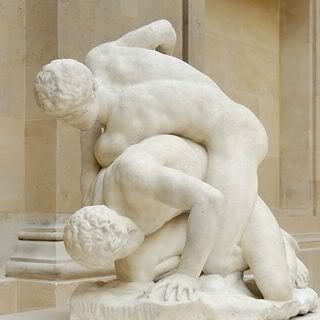
Uffizi Wrestlers, The Louvre
The Greeks considered beauty, youth, and excellence as virtues. That Christendom ultimately defaced these virtues, as its minions vandalized the majority of the holy sites and artwork of pagan antiquity, is an unerasable blemish upon Western civilization.
The debasement of beauty in favor of drab obligation, the denial of the glow of youth, which bears the only real glimmer of a heaven, in favor of a static eternity, and the elevation of humility over excellence are crimes against humanity and nature alike.
The English Romantic poets, especially Shelley and Keats, saw beauty as the virtue it is--imperfect here on earth, as neo-Platonic Shelley asserted again and again, and yet, then, so are all virtues imperfect here on earth.
Shelley felt that pleasure and beauty are the only way, given the absence of God, to approach the Ideal--humanity's sublime nature, perhaps unrealizable at all, but if at all possible, possible because of the human imagination's capacity for perfecting nature and morality.
For Shelley, only the Ideal transcends the mutability or constant flux of earthly existence.
Shelley's higher moral code is based on beauty--"intellectual beauty," the ideal and thus unchangeable essence of beauty. "Poets are the unacknowledged legislators of the world" because it is the poets or artists who implicitly criticize the present by showing us the possible futures. Or, as Blake nimbly and simply puts it, "What is now proved was once only imagined."
By seeking perfect beauty and perfect pleasure, poets and artists recreate the world, make it a better place in reality, by raising the standard higher.
Keats's humbler claim is that "Beauty is truth; truth, beauty"--like Shelley affirming that the object of beauty or art contains the truest metaphysics (a truer truth than philosophy, religion, or science can provide), but perhaps, unlike Shelley, denying the existence of an Ideal above and beyond reality.
At its heart, Keats's concept of "negative capability" is the acceptance of What Is, as opposed to Shelleyan or Platonic idealism, an acceptance of reality, he felt, only the highest geniuses (like Shakespeare) can attain--this too is the presence of mind or mindfulness of Eastern philosophy.
Keats teaches us that the beauty that is, the real and transient beauty of the real world and of real people, and the real but fleeting pleasures of living, are the only truth and transcendence we need to hold on to our humanity.
Art is for art's sake. Beauty is for the sake of beauty. Youth is for youth. Excellence is for excellence. No loftier moral is needed.
No comments:
Post a Comment